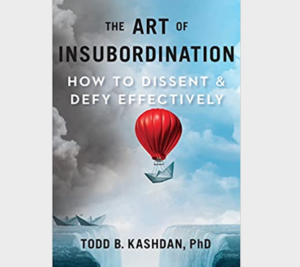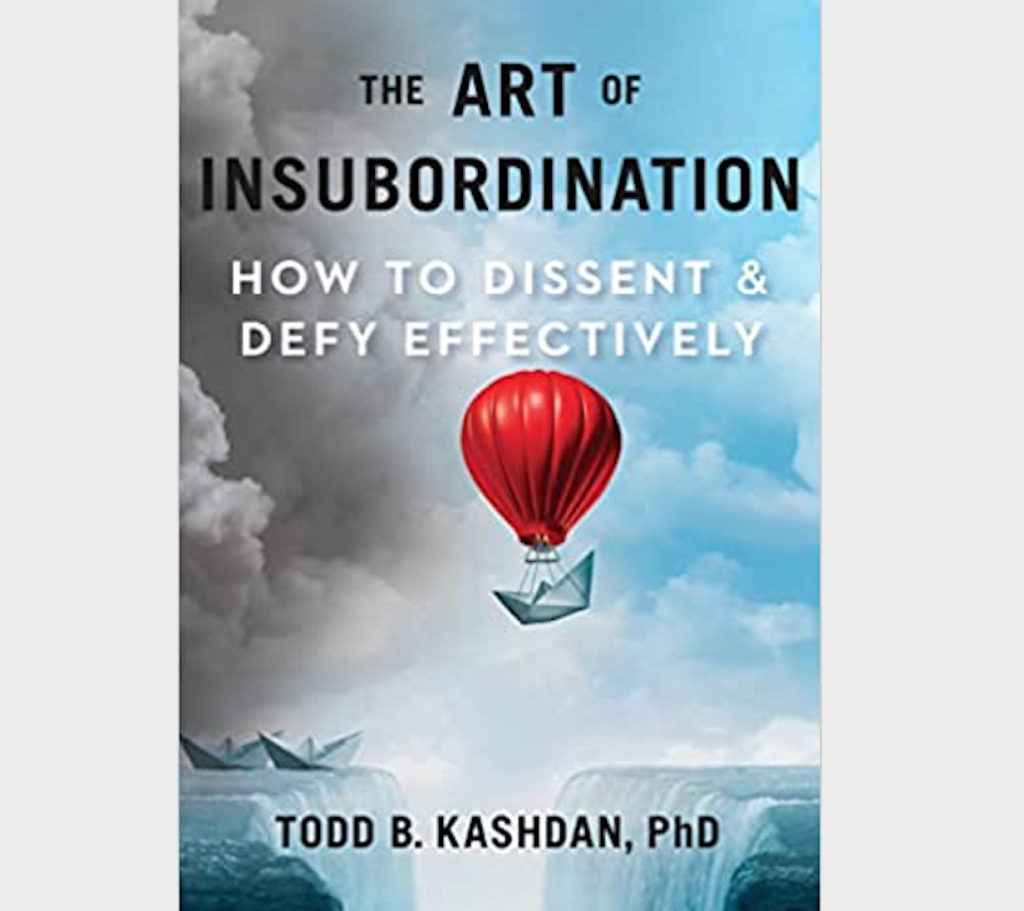 The Art of Insubordination: How to Dissent and Defy Effectively, a provocative title in a time of incredible social turmoil. One may think Todd B. Kashdan focuses on defying a system that is oppressive and conformist; the title brings to mind today’s dominant political polarization and the culture wars but also the professional and academic communities that decry individual dissent. In some ways, this is exactly what this book addresses, but in a more profound way, it is a book about taking the chances necessary to discover yourself and build a deeper understanding of your relationship with the society around you. It is a book about growth – about psychological creativity, bravery, and flexibility.
The Art of Insubordination: How to Dissent and Defy Effectively, a provocative title in a time of incredible social turmoil. One may think Todd B. Kashdan focuses on defying a system that is oppressive and conformist; the title brings to mind today’s dominant political polarization and the culture wars but also the professional and academic communities that decry individual dissent. In some ways, this is exactly what this book addresses, but in a more profound way, it is a book about taking the chances necessary to discover yourself and build a deeper understanding of your relationship with the society around you. It is a book about growth – about psychological creativity, bravery, and flexibility.
This ‘cookbook’, as the author describes it, is about cultivating the strength to explore, openness to ideas that you can stand behind, the power to stand up for your beliefs, and the wisdom of humility. The reader is asked to consider their personal internalized social expectations in a critical light – challenge both forms of cognitive bias but also challenge the passive acceptance of social values. This psychological nudge is delivered through historical examples that tickle the curiosity funny bone but are also incredibly relevant in light of current events. They range from topics such as the male basketball players’ resistance to throwing underhanded to our historical complicity in violations of civil rights. What does it take to remain complicit when we feel internal distress and what does it take to nurture the bravery necessary to practice small and large acts of rebellion? It’s easy to see these examples generalized to current efforts of organized labor and the frustrating attempts to return to a pre-COVID world in the classroom that had its own problems we never addressed. Even if you do not see yourself as a rebel, your daily life is filled with opportunities for small acts of insubordination that could improve your lived experience and our shared experience.
Throughout this guided self-exploration, we are also presented with a critical synthesis of scientific evidence from social-emotional research. This includes the surfacing the recent research investigating ‘grit’ as a psychological construct through a clever critique without dismissing it. He practices what he suggests in this book by demonstrating critique and humility, and he asks that you do the same. Even when I found myself wanting to disagree, I felt cleverly disarmed and open to very valuable lessons.
Communities of research and practice often lead us to question whether we belong. His practices will help you not only fight effectively to be heard but also facilitate your development as a better team player at work. It’s not always about finding a new bubble sometimes it’s about exerting personal agency in a skilled way helping others recognize your value but also humbly recognizing theirs. There are more options offered here than subordination, changing careers, or feeling the pressure to fight for your life.
The book also lends itself well to educators and parents. It has an entire section devoted to the deliberate scaffolding of ‘insubordinate’ children, and this easily is generalized to teaching. One of the core goals of education is to foster critical thinking, but too often our goal of critical thinking simply is interpreted as a need to ‘be critical’. The author drives home the point that being a critical thinker involves being humble, empathetic, creative, and open-minded. As much of our current discussions are in echo chambers, the book helps readers as parents and participants in society engage in new diverse social arenas where we can negotiate new realities. Kashdan does not just tell you how important this is, he also builds a road map and offers practical exercises to help you navigate the social and emotional difficulties that will arise when you meet dissenters.
Principled rebellion is not about fighting others, is about the deliberate effort to challenge a system. It is not about combating and tolerating others, it’s about welcoming and fostering ways of thinking. Kashdan encourages us to cultivate our creativity, bring together disparate ideas, and open our minds to challenge systems.















